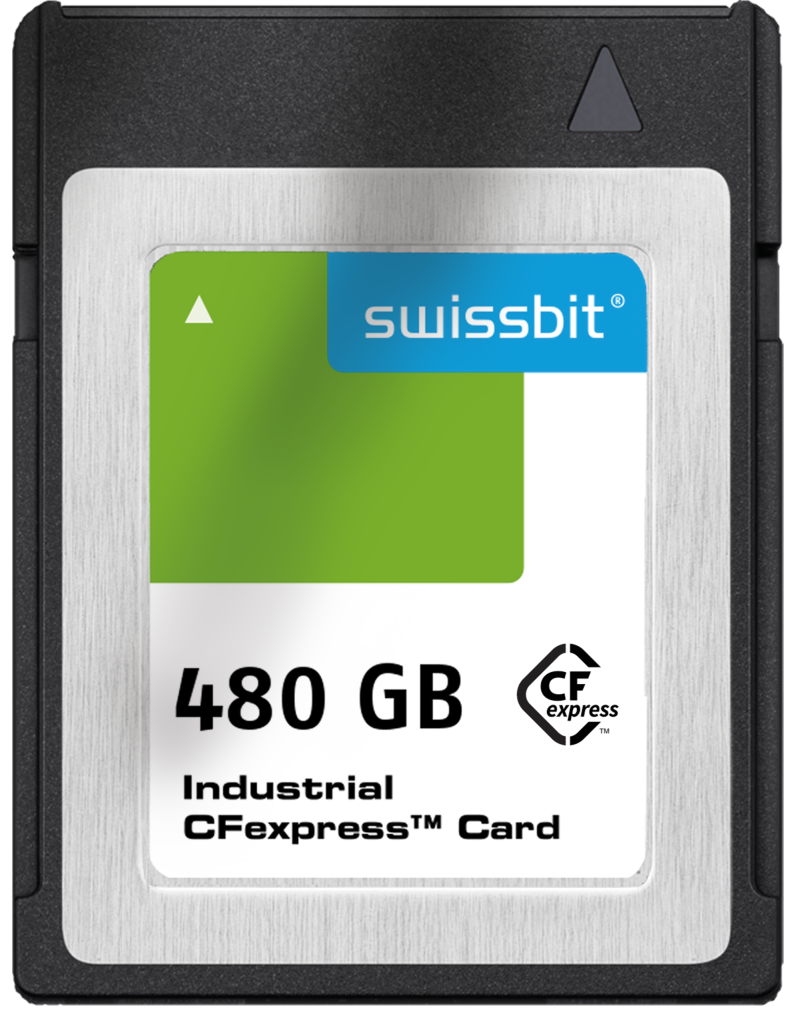CFexpress 2.0 G-20 Card Series
CFexpress 2.0 G-20 Card Series
Named as "G-20" for the cards with 3D-TLC-NAND and "G-26" for the pSLC version, the fast and pluggable storage media will be available from the end of 2020. The latest memory card series offers capacities of up to 480 GB and a high-performance interface in accordance with 2-lane NVMe-1.3 and PCIe-Gen 3.1 specifications. It is aimed at a wide range of applications in the fields of industrial automation, gaming, transportation, and medical technology. The robust memory media combine the flexibility of Swissbit memory cards with the read-write performance of PCIe SSDs.

Swissbit announces the launch of CFexpress 2.0 Type B cards that offer highest reliability, performance and data protection features that meet top industrial grade requirements. Named as "G-20" for the cards with 3D-TLC-NAND and "G-26" for the pSLC version, the fast and pluggable storage media will be available from the end of 2020. The latest memory card series offers capacities of up to 480 GB and a high-performance interface in accordance with 2-lane NVMe-1.3 and PCIe-Gen 3.1 specifications. It is aimed at a wide range of applications in the fields of industrial automation, gaming, transportation, and medical technology. The robust memory media combine the flexibility of Swissbit memory cards with the read-write performance of PCIe SSDs.
CFexpress is hailed as the successor of the established Compact Flash and CFast-standards, created by the CompactFlash Association. Originally developed for high-end photography and other consumer applications, Swissbit has now applied the storage format to its latest products for use in demanding industrial applications. The CFexpress 2.0 Type B casing offers excellent mechanical protection in harsh environments. The gold-plated pins are completely covered and shielded from any form of contact, therefore offering protection from dust or moisture penetration, and at the same time, making the cards resistant to any vibration. Thanks to the NVMe-1.3 interface, a proven technology for other industrial SSD form factors such as M.2 or U.2, the G-20 series achieves up to 1620MB/s for sequential read operations, and 840MB/s for sequential write operations. For random accesses, it exceeds 128000 and 131000 IOPS for read and write operations respectively. CFexpress is a significant technology advancement when compared with a read data rate of 120MB/s for Compact Flash cards and 520MB/s for CFast.
Swissbit Promotes Adoption
"As an established supplier of Compact Flash cards and one of the first advocates of the CFast standard, the next logical step for Swissbit is to manufacture and supply exchangeable memory cards with the latest interface standard. We believe that this form factor will have a high value for customers who need to quickly replace or upgrade memory in the field. We are convinced that this format will prove to be an industry-wide 'game changer'", explains Roger Griesemer, General Manager Memory Solutions at Swissbit AG.
As an industrial flash memory, the G-20 series was developed specifically for efficient heat dissipation. Combined with sophisticated firmware mechanisms, this allows for its use in high-temperature environments and fanless systems. To achieve low power consumption without sacrificing performance, G-20 eliminates the need for a local DRAM cache by using the HMB (Host Memory Buffer) function and uses the system DRAM memory for FTL management. Special data maintenance functions provide additional protection of stored data at high operating temperatures.
Extra-Endurance
For applications that require a particularly long product life, continuous writing of small data packets or very long maintenance intervals, Swissbit offers the G-26 version, which uses pure pSLC mode to achieve a tenfold longer life span compared to the G-20.
Security Functions
The Swissbit-G-20 has a variety of standard and optional data protection features, including end-to-end data protection that ensures the full integrity of internal data paths. TCG Opal can be ordered as an option and provides additional data protection towards the host system. AES-256 encryption guarantees security for intellectual property, licenses or other sensitive data. This includes applications where device settings and configurations need to be transferred from device to device while ensuring that they are reliably protected. The new series supports the Swissbit Life Time Monitoring Tool as well as the S.M.A.R.T. commands, thus enabling the user to monitor the status of the memory card and to define a strategic replacement plan.





